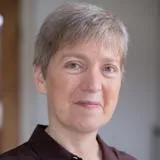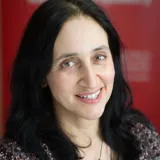The findings from our research highlight the urgent need for comprehensive support services for trafficking survivors, who often face long-term health consequences from their traumatic experience. Escape from situations of human trafficking cannot be equated with recovery from its harms.
Dr Sian Oram, Head of the Section of Women’s Mental Health at King’s IoPPN
16 August 2023
Human trafficking is the use of threat, force, deception, or manipulation to recruit or move people for exploitation. It is a form of modern-day slavery and one of the fastest-growing criminal industries.
There are over 122,000 trafficked people annually in the UK, and around 40 million trafficked people worldwide. This highly vulnerable and often hidden group is in desperate need of support, services and advocates.
Trafficked people experience known risk factors for mental illness including violence, abuse and deprivation. King’s research has been critical in understanding the mental health toll of human trafficking and how services can better support this group. Researchers from the Institute of Psychiatry, Psychology & Neuroscience (IoPPN) have identified barriers for trafficked people in accessing health services, highlighted the lack of training for healthcare professionals on the specific needs of trafficked people and informed the development of new training materials. Insights have led to new governmental guidance to identify and respond to human trafficking.
Addressing the evidence gap
In 2012, a King’s systematic review found just four studies looking at the mental health of trafficked people, only one of which included people in the UK. Since then, the PROTECT (Provider Responses, Treatment, and Care for Trafficked People) programme, led by Professor Louise Howard, has pioneered research into human trafficking and mental health in the UK. Co-investigator, Dr Sian Oram – internationally recognised as the leading researcher on mental health and human trafficking – led on data collection and analysis and co-investigator, Melanie Abas, Professor of Global Mental Health, advised on cross-cultural and clinical aspects of the research.
Through PROTECT, researchers helped address the gap in research on human trafficking and mental health. They particularly focused on the needs and healthcare experiences of trafficked people in high-income settings such as the UK, how trafficked people access health services and NHS professionals’ readiness to respond.
The unique mental health needs of trafficked people
Trafficked people are among the most difficult to reach, raising many challenges for research. King’s researchers surveyed 150 trafficked men and women in England who had escaped exploitation and were receiving assistance from post-trafficking support services. The research demonstrated that many trafficking survivors experience medium- to long-term physical, sexual and mental health problems, including injuries, sexually transmitted infections and probable depression, anxiety and post-traumatic stress disorder. King‘s research drew attention to the high levels of violence experienced by trafficked people, with two-thirds of the women reporting rape during trafficking. Researchers also conducted research into maternity care for trafficked women; 29 per cent reported one or more pregnancies while trafficked.
King’s constructed the first ever UK clinical cohort of trafficked people using the Clinical Record Interactive Search (CRIS), a platform developed by the National Institute for Health and Care Research Maudsley Biomedical Research Centre that enables researchers to investigate patient records without accessing personal data. This showed that, when compared to people with similarly severe mental illness, trafficked people are more likely to be detained under the Mental Health Act and have a longer inpatient stay. This research also found that trafficked people with severe mental illness experience a high prevalence of childhood and adulthood abuse, and an ongoing vulnerability to abuse after escaping exploitation. Their findings provided evidence of the complex and inter-related needs that must be addressed within this group.
Through their work, King’s researchers included abuse from experiences of trafficking in the International Statistical Classification of Diseases and Related Health Problems, 10th revision clinical modification (ICD-10-CM) – the global standard guidance for making diagnoses. For the first time, abuse from trafficking was differentiated from other forms of abuse. This recognition of the harm caused to trafficked people has allowed survivors to access appropriate treatment and potentially enables healthcare professionals to better track provision of care.
The inclusion of trafficking-related abuses in the International Statistical Classification of Diseases is a significant step forward, acknowledging and addressing the specific harm inflicted upon trafficked individuals, while contributing to the development of more comprehensive data globally.
Professor Louise Howard, Professor Emerita of Women's Mental Health at King’s IoPPN
Identifying barriers to care for trafficked people
Interviews with trafficked adults found that only one fifth had accessed NHS services via GP surgeries, walk-in-centres, A&E departments and termination of pregnancy services. This highlighted the opportunity to work with those who attend services, but also the challenge of identifying those who do not. Maternity services were pinpointed specifically as a resource to aid the identification of trafficked women, although there was a need for greater training for maternity health professionals. These findings highlighted that the NHS could play a central role in the identification, referral and provision of care to trafficked people, during exploitation and after escape.
Trafficked people face several key barriers to accessing health services. Researchers found that they did not seek, or could not access, care due to a lack of documentation, language barriers, lack of knowledge of services or concerns about repercussions from traffickers, police, and/or immigration. Trafficked people who had escaped exploitation required considerable support from caseworkers to navigate registration systems and access appointments. Many of those who were permitted to access healthcare services reported close monitoring from their traffickers which made private consultations almost impossible.
Improving training for healthcare professionals
NHS services are important points of contact for trafficked people, making them potential routes to identify and support this vulnerable group. However, research highlighted a lack of knowledge and confidence among NHS professionals on how to respond to trafficking: overall, 78 per cent of NHS staff reported that they had insufficient training to support trafficked people despite expressing a desire to receive training. The unique position of healthcare professionals was not being effectively utilised to identify and support trafficked people, who are otherwise hidden from view.
King’s research led to the provision of specialist training for healthcare professionals in this area and informed the development of national training guidelines. Their findings informed the Royal College of Nursing on advising their members and trainees to identify and respond to suspected cases of trafficking, leading to the production of the Modern Slavery and Trafficking Guidance. Since publication, 10,000 print copies have been distributed and at least 2,000 copies downloaded, plus it is recommended in a list of resources in the Home Office’s Modern Slavery Unit. Following their research demonstrating the contact of trafficked women with maternity services, and at the request of the Royal College of Midwives, King’s researchers developed an iLearn module for midwives on responding to human trafficking and modern slavery, which was launched in 2021. King’s work also informed the content and delivery of the VITA network training for healthcare professionals, commissioned by NHS trusts to provide training on health responses to modern slavery.
King’s research has helped caseworkers and legal advisers to advocate for trafficked people, through gaining access to specialist post-trafficking healthcare services and supporting successful applications for 'Leave to Remain' and claims for survivors’ asylum and immigration.
At a time of uncertainty about access to care for certain groups of trafficked people, this research underscores the need to protect healthcare for all victims of trafficking, regardless of their background and circumstances.
Professor Melanie Abas, Professor of Global Mental Health at King’s IoPPN
Influencing UK policy on the mental health needs of trafficked people
The PROTECT report has been instrumental to informing UK policy and guidance on supporting victims of human trafficking. The report underpinned 2015 guidance from the Department of Health and Social Care (DHSC) on identifying and responding to human trafficking, as well as being featured in Public Health England’s guidance on supporting victims of modern slavery in healthcare settings. These changes to government guidance led to the development of NHS England guidance on safeguarding victims of modern slavery, and has helped inform the below nationally disseminated video produced by NHS England to educate healthcare professionals about modern day slavery.
In 2016, King’s researchers presented findings on trafficked people’s contact with health services to Parliamentary Under Secretary of State for Public Health and Innovation, Nicola Blackwood, during her visit to South London and Maudsley NHS Foundation Trust. They were then requested by Baroness Butler-Sloss to author a briefing paper with the Helen Bamber Foundation on the mental health difficulties experienced by trafficked people. The paper, which featured King’s research, was cited by the Work and Pensions Committee in their 2017 inquiry into Victims of Modern Slavery as evidence for the physical and mental health difficulties experienced by trafficked people.
King’s research also supported the Human Trafficking Foundation, an organisation which aims to shape human trafficking policy and legislation by equipping policy makers and statutory agencies with evidence. The PROTECT report underpinned an improvement in the Human Trafficking Foundation’s 2018 Trafficking Survivor Care Standards, developed to ensure that all professionals working with trafficked people provide high quality, evidence-based and consistent care. The Home Office have committed to incorporate these standards into its Modern Slavery Victim Care Contract as part of the National Referral Mechanism, the system by which potentially trafficked people are identified and signposted to services and support.
Working with people with lived experience of modern slavery, King’s researchers have now identified a set of core outcomes central to recovery and wellbeing of survivors. This core outcome set is used as a framework to guide policymakers, researchers and service providers in developing and evaluating interventions. It has been cited by the Modern Slavery Policy Evidence Centre and included in a written evidence submission to Parliament about the Illegal Migration Bill.
Researchers also established a Community of Practice, comprising of survivor leaders, service projects and other key stakeholders, that will ensure that the outcome set is embedded in practice. The community facilitates online discussion forums, podcasts and workshops to keep up the momentum of the project.
Increasing public awareness and engagement with human trafficking

King’s research has increased public awareness of the mental health impacts of human trafficking, with national and local media coverage of research. A collaboration with Syrian artist, Sara Shamma, and the Helen Bamber Foundation resulted in a 2020 exhibition titled Sara Shamma: Modern Slavery, curated by Kathleen Soriano. The project was inspired by Shamma’s first-hand experience of hearing the traumatic stories of women and girls who have been kidnapped by ISIS in Syria and Iraq. The exhibition aimed to help shine a light on the challenges faced by modern slaves and advocate for change, and resulted in coverage in more than 30 national and international media outlets.
Public engagement initiatives, like Sara Shamma: Modern Slavery have widened the impact King’s research has made in changing the political, legal and health landscape to address the needs of trafficked people.
Bringing together a range of research insights has enabled a better recognition of the mental health needs of trafficked people, as well increasing the public awareness of this hidden group. Health services are in a unique position to identify, refer and provide care to trafficked people, and King’s has demonstrated the value of research to inform policy, enhance healthcare standards and develop professional training in this area.



